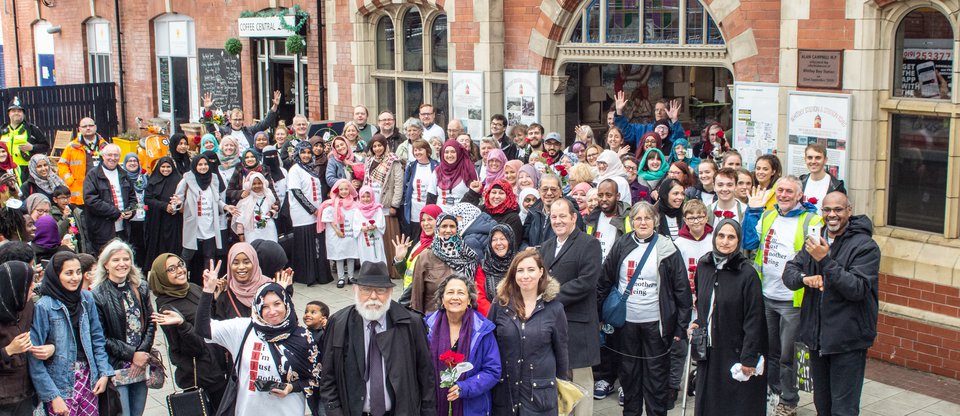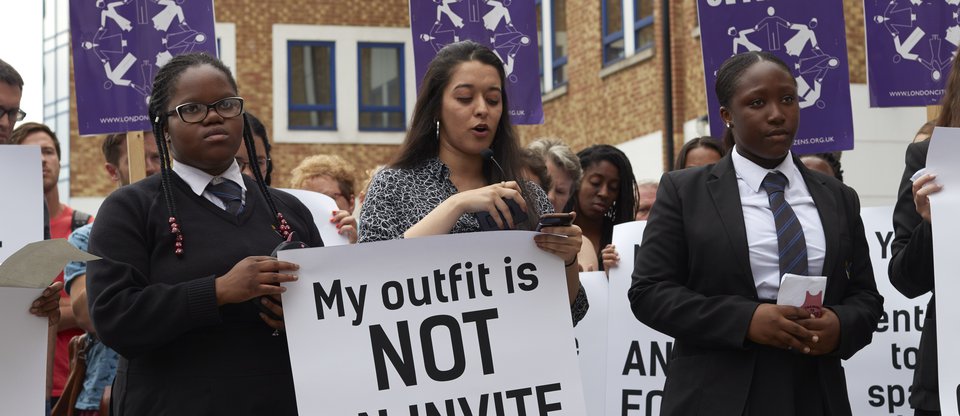New research shows women are three times more likely than men to experience both threats and acts of sexual violence and assault

Today we launch a powerful piece of research - Overcoming everyday hate in the UK . Involving hundreds of Citizens UK members in hearings across England and Wales this independent study details the shocking extent of hate crim e. With a specific focus on acts of hate directed towards women it gathers experiences of t he many different groups of people in our communities affected .
From the wom a n who was slammed against a wall a n d threatened with sexual assault during a barrage of anti s emitic abuse in Manchester , to a Muslim woman who was punched in the face at a traffic light in Birmingham , this report demonstrates the urgent need for action to safeguard communities and keep our streets free from hate.
Key findings from the research Hate motivated by gender is already a factor in 33.5% of all existing hate crime - and yet gender is not currently protected under hate crime law. Over six in ten victims of hate crime in the survey said they never reported any hate crime they experienced , while a further 26% said they only sometimes reported. Muslims reported the highest rates of out of any religious group and Muslim women were disproportionately affected by hate crime. Hate crime hurts more than identical non-hate-motivated offences. For example, twice as many people affected hate-motivated physical assault reported suicidal feelings, than a non-hate motivated assault. 84.1% of all participants expressed support for an intersectional approach to hate crime (for example being able to report an attack that was both racist and misogynistic). 67.7% of trans people or those with non-binary gender identities also said they never reported hate crime.Two of our participating members called for the Law Commission consultation to clearly lay out the path to solutions :
Rabbi Robyn Ashworth Steen, from Reform Synagogue in Manchester said:
“ There are some shocking stories from my community including misogyny, transphobia and homophobia alongside antisemitism. We’ve shared evidence with the Government review and community safety remains a top concern – as women, as Jews, as people who are gay. This abuse sadly hasn’t gone away since lockdown.”
Imam Abdul Basith Mohammed, from Newcastle Central Mosque, said:
“Attacks against Muslim women are a clear and present danger and are having a hugely damaging effect on their wellbeing, and confidence using public transport or to go to public places. This must end. We need a better reporting system to ensure people feel confident that they will be taken seriously.”
Read the full report nowThe study finds that, while the motivating factor behind many assaults is principally gender, and overwhelmingly affecting women, there is no uniform way for law enforcement agencies to record the nature of assaults .
The report recommends the UK Government levels up the criteria to include misogyny hate crime specifically, to allow women to report hate incidents accurately according to the reasons they were targeted.
The study is based on findings from over 1,000 respondents and focus groups in five cities (Birmingham, Cardiff, Newcastle, Manchester and London) . The study is authored by Dr Farhan Samanani of the Max Planck Institute for the Study of Ethnic and Religious Diversity .
What comes next?

The study recommends the uniform adoption of misogyny as a hate crime across all police forces in England and Wales, as well as training and greater accountability for institutions responsible for safety in public spaces, such as transport providers.
Since Nottingha mshire Police’s adoption, a review was launched in 2018 by the then Justice Minister Lucy Frazer MP in England and Wales. Scotland has begun the process of taking misogyny hate crime through the Holyrood Parliament. However, many police forces are awaiting the outcome of the Law Commission review, which is shortly due to go into public consultation imminently.
Retired police Chief Constable Sue Fish, who pioneered the adoption of misogyny as a specific category of hate crime in Nottinghamshire, says that the study demonstrates the need for all police forces in England and Wales to record misogyny hate crimes and calls on the Government to ensure the important reforms are adopted, two years after a review of hate crime was launched.
Sue was joined in the call for misogyny to be a hate crime by another senior policing expert, Philip Grindell, who was the Scotland Yard Detective Inspector brought in following the murder of Jo Cox MP to run the unit to prevent any further attacks and investigate the abuse.
He said: “Women are being disproportionately targeted on the basis of their gender. There is ample evidence of an escalation of threats and attacks against high profile women – reflecting a wider problem in society at large and the need for policing to adjust accordingly.”
How can you help? Sign up to get more news about our campaign to make making misogyny a hate crime here.



